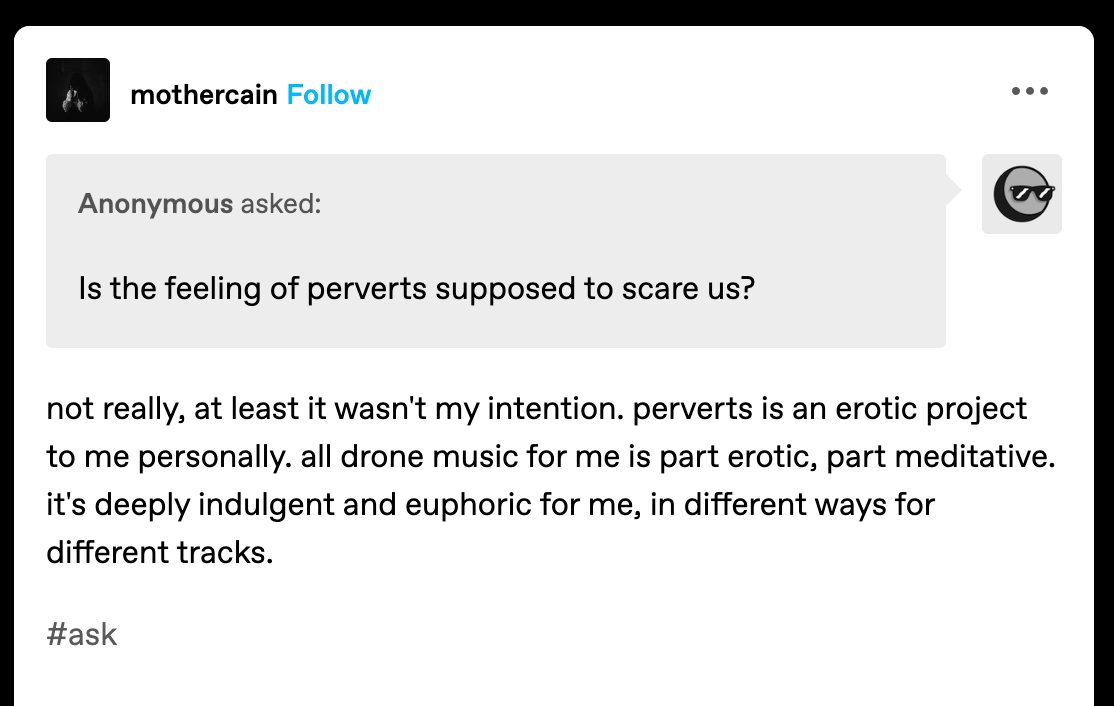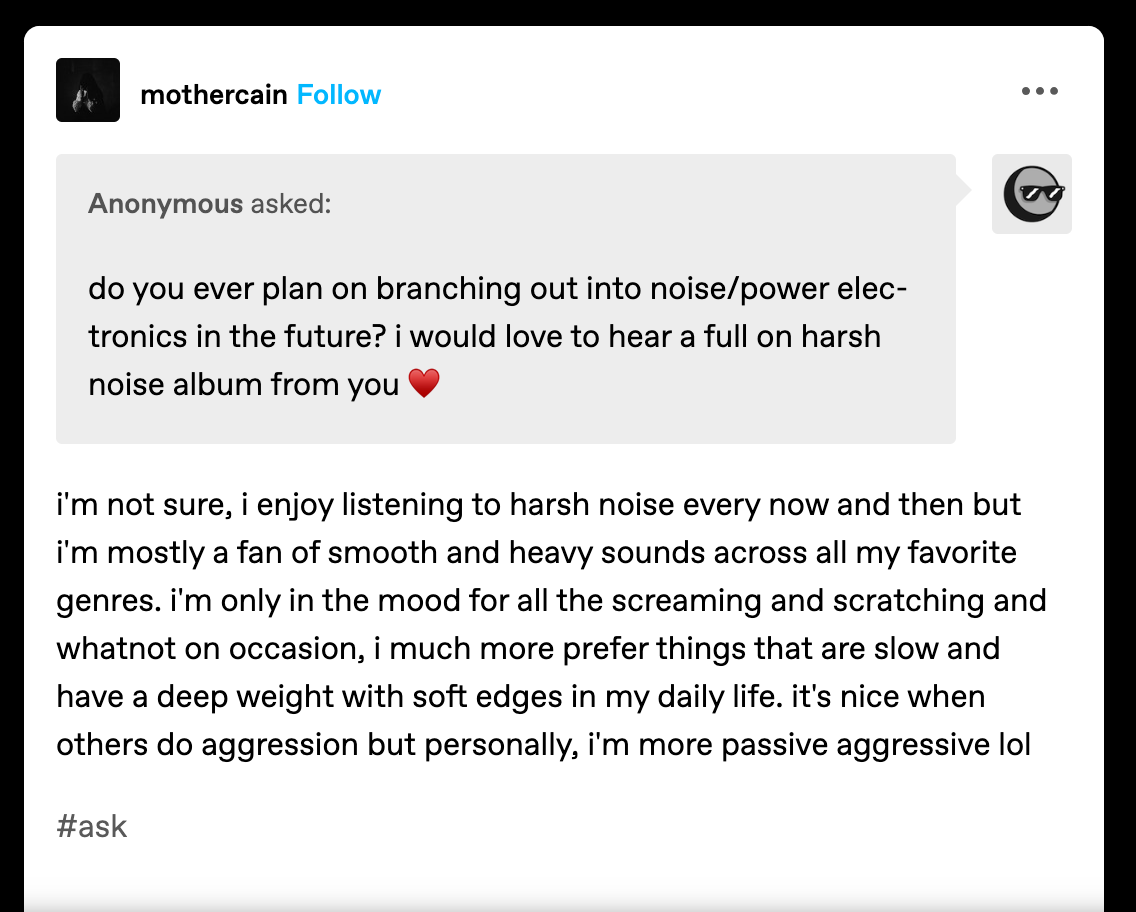10. Perverts - Ethel Cain
Ethel Cain's Perverts and the personal grapple with creativity in an age of tech supremacy and anti-intellectualism
A growing debate regarding AI’s role in our lives and the way it’s being emphasized to reduce creativity has been at the forefront of my mind. From the Suno AI CEO saying people don’t enjoy making music with instruments, to the discourse about the use of AI in voice alterations in the film The Brutalist, it seems we cannot escape the ultimate philosophical questions regarding technology’s reach and its impact upon the creative space. This ultimately led me to question what even is creativity in 2025. As we are reaching peak levels of consumption where everything is available to our finger tips, we are so overwhelmed by choice that we end up in our own niche bubbles. How do we play with, and question, our own creativity, and what role creativity plays in our own lives?
I first tried to listen to this album the day it came out, but quickly came to realize this was not going to be background music as I go through my day at the office, drudging through the corporate daily slog. I made plans with a friend to sit, one Saturday afternoon, and slowly absorb and share in our listening of the album.
Many reviews and critics have called this album difficult, challenging, a body of work to be reckoned with on an innate personal level. And while I do not disagree with these labels, I also do not see these as negative attributes. This is a body of work that needs to be sat with, slowly indulged and melted into, almost like it permeates into your own depths.
In thinking about how to even approach discussing this album, I felt a bit lost. I’m not as familiar with the worlds of ambient or drone music, and do not want to gloss over inspirations or notes that I am missing through my lack of knowledge. But more than that, it is that this album needs to be listened to, rather than read about (a novel idea for a music album, right?). It was validating to see the following quote in one of the reviews Cain shared on her Tumblr — “Attempting to review an album like Perverts that asks so plainly not to be interpreted feels like an imposition on the work. It’s clear that Cain’s intent is to clear space for experience rather than produce content to be read… It seems more like a shift in priorities, an adjustment toward the undertones of Preacher’s Daughter that doesn’t allow for the cathartic release of analysis or ironic meme-making, and a genuine request for an increasingly rare earnest engagement with art.”1 In a comprehensive review of the album, Adrienne Economos Miller goes on to examine the album in relation to various texts and materials on meditation, death, and nature, including the work of Etienne Boullée for which one of the tracks is named after (for further, great reviews in to the substance of this album, I recommend this review, as well as the following: The Line of Best Fit; The Guardian).
Rather than the substance of this album, the subsequent reaction online really got to me. Seeing people react so negatively to the intent of the work on apps like TikTok, making posts ad naseum about the album just being noise, really grated me. Even if there were portions of the album that I physically could not stand, and made me want to pick at my skin, sitting with it and experiencing that negative feeling in and of itself is a way of engaging with art. Leaning into what drives a negative response from your experience is also a way to embrace the things that positively drive your creativity and joy. In a scientific reaction, the positive and negative come together to generate balance — positivity cannot be charged without the appropriate amount of negative to power it.
With a rise of technology, quick dopamine hits, and the ever decreasing attention span, the way we engage with art has drastically changed. Couple with critical reasoning skills dropping, and the rise of anti-intellectualism, projects like Perverts are likely seen as pretentious, modern art pieces that do not resonate in spaces where everyone is looking to be accepted by one societal norm.
Take for instance the reaction to the album on Tiktok. People getting thousands of views to say they hated it or to make meme-fodder making fun of the intricacies of what lays beneath the surface level of the tracks feeds into the cultural homogeneity that social media is ultimately molding right before our eyes.
Ultimately, we don't have to like or get everything an artist gives us. That in and of itself is a concept that feeds and informs the creative cycle. It is up to the artist what they want to put out — if that is to feed the masses, gain fans, be rich, so be it. If that means creating what feeds their inner soul and perhaps does not get picked up by the populace at large, there should also exist a space wherein that can also thrive.
This leads to discussion of anti-intellectualism. At its core, the algorithmic homogeneity and monoculture that is taking over our lives in fashion, home decor, music, film, and all other creative ways is in some ways considered a leveler. It makes people feel that anyone and everyone can be cool, stylish, creative. We can all access the things that unlock the levels of upward societal movement just by buying into this type of consumption.
But beyond that, it also generates and fuels anti-intellectualism in the creative space. We stop questioning why we are consuming these things, buying them, listening to them, making them everything we supposedly enjoy. Our minds are not being tested to question or critically examine how we interact with things, why we consume them, what they make us feel. Things are not being consumed on a deeper level, and we are finding comfort in the superficial that glazes over our eyes in a rosy haze.
Listening to Perverts subverted this for me — it made me lean into the negative reactions I felt on some songs, the meditative state it brought my mind on others, and the overall feel of gloom and darkness in space that is often unexplored in mainstream media. There is a pervasiveness to this project in the way that it sits with you. That in and of itself was important to me — that I could take away this challenge to myself, and think beyond the music.
A friend of mine sent me this TED Talk by Ethan Hawke the other day, and it brought many of these thoughts and feelings full circle. Cain leaning into her own interests and depths to be creative and nourish her own interests after the uncomfortable success and limelight she received helps push artistic boundaries for society, not just for her own selfish pursuits. Committing to what moves and drives her is what will fundamentally feel authentic, and therefore valuable to a listener.
I also found this quote (below) floating around — attributed to the singer Beck (though I am not completely convinced of its source), it called to mind the way in which people box others in and expect a level of stagnation in creativity and artistry so as to satisfy their own interests. The push towards an algorithmic monoculture where people become afraid to be different from the norm, and to pursue true creative challenges, will ultimately only lead society for the worse.2
My whole generation's mission is to kill the cliche...it's one of the reasons a lot of my generation are always on the fence about things. They're afraid to commit to anything for fear of seeming like a cliche. They're afraid to commit to their lives because they see so much of the world as a cliche.
Whether it is being creative, or leaning into the chance of being cliche, not committing to anything beyond what would be societally acceptable is limiting and keeps us in boxes. As our societies converge into small, organized mini boxes of monoculture where everyone in every place on the Earth is subscribed to the same 5 paths, how do we test our own boundaries and limits to push beyond and create worlds and spaces for new ideas and thinking?
Thanks for tuning in.
“Ethel Cain’s new EP invokes Étienne-Louis Boullée’s sublime by trading storytelling for space making” by Adrienne Economos Miller, available at https://www.archpaper.com/2025/01/ethel-cain-new-ep-etienne-louis-boullee/
There is also something to be said about conversations around poptimism, the term snob, and how that all fits into liking, or being critical of, mainstream/non-mainstream art. But at the end of the day, such discourse is part of the overall idea that its mere existence pushed the boundaries. Without the existence of diverse art, such discussions would not even exist, and the art we consume would all be the same.






"Even if there were portions of the album that I physically could not stand, and made me want to pick at my skin, sitting with it and experiencing that negative feeling in and of itself is a way of engaging with art."
So true. Good art doesn't always need to make us feel good.